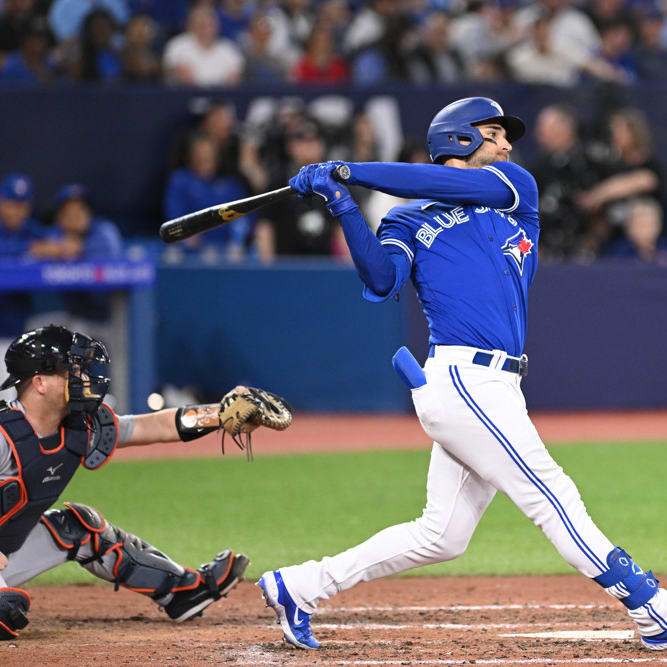This article is part of our The Saber's Edge series.
I feel a little bad using a horrible event like a family member's death to further my fantasy team, but the rest of baseball does once the fact is known. Other sources have used these events to show why a player might be struggling, or a player might dedicate their great play to those who have recently passed. While the event is tragic, the narrative must go on.
In 2014, for example, Jean Segura lost in son in July. Almost no account of Segura's production after that point was written without a mention of his son's death. Google says there are more than 48,000 articles that contain "Jean Segura son death second-half struggles." Even this February after he was traded from the Brewers to the Diamondbacks, the narrative continued when Ken Rosenthal of Fox Sports wrote:
"Death of son, lack of long-term security in Milwaukee may tell even greater story of shortstop's struggles than do his stats."
Death will almost be a story and the media
I feel a little bad using a horrible event like a family member's death to further my fantasy team, but the rest of baseball does once the fact is known. Other sources have used these events to show why a player might be struggling, or a player might dedicate their great play to those who have recently passed. While the event is tragic, the narrative must go on.
In 2014, for example, Jean Segura lost in son in July. Almost no account of Segura's production after that point was written without a mention of his son's death. Google says there are more than 48,000 articles that contain "Jean Segura son death second-half struggles." Even this February after he was traded from the Brewers to the Diamondbacks, the narrative continued when Ken Rosenthal of Fox Sports wrote:
"Death of son, lack of long-term security in Milwaukee may tell even greater story of shortstop's struggles than do his stats."
Death will almost be a story and the media may hang onto the narrative longer than the players involved.
On the opposite side of the spectrum is childbirth. Do players get nervous about imprending births and do they lose sleep after birth? Or do they seem separated from the process? With all the MLB transactions publicly available, these instances are easy to track.
We will never know exactly what each player is going through in each case, but by looking at average change in performance, we can get an idea of what to expect. I will start with hitters and look at how they performed when a death or birth happens in their life.
Hitters
Here is the technical data. The transaction data was from 2010 to 2015 with the "leave" season and those before and after examined. I weighted the data change by plate appearance, so players who played more will have their stats counted more. Additionally, I have included the normal aging factor for all players with the same median age over the same time frame.
To start, here are the changes in hitting when the player was placed on bereavement leave once during a season (average age 28.2, median age is 28).
| STAT | CHANGE Y-1 to Y | NORMAL CHANGE | CHANGE Y to Y+1 | NORMAL CHANGE |
| AVG | 0.003 | -0.003 | -0.011 | -0.003 |
| OBP | 0.005 | -0.004 | -0.010 | -0.003 |
| SLG | -0.013 | -0.013 | -0.006 | -0.001 |
The changes here are not uniform in any way with AVG and OBP shooting up a tad when normally there should be a drop. Additionally, the season after the tragedy, the hitters' stats drop the more than expect. I am not going to try to guess why these numbers don't follow what is expected, but overall, the change is minimal. There is no difference in OPS (OBP+SLG) from the expected and actual values (-.021).
Moving on, here are the values for players when on paternity leave (average age of 29.5, median value at 29)
| STAT | CHANGE Y-1 to Y | NORMAL CHANGE | CHANGE Y to Y+1 | NORMAL CHANGE |
| AVG | -0.001 | -0.002 | -0.002 | -0.008 |
| OBP | -0.002 | -0.003 | -0.008 | -0.006 |
| SLG | -0.009 | -0.001 | -0.014 | -0.010 |
A little less to explain here with all the numbers heading in the same direction with the expected amount being similar. The drop is a little more than expected with the normal decline being 11 points of SLG and the actual being at 23 points.
Overall, it doesn't seem like these life events have an effect, positive or negative on a hitter. Now for the pitchers.
Pitchers
With pitchers, I looked at the change in ERA, FIP and K/BB and used the same method described above for hitters to determine the change except I used IP instead of PA to weight the player. Again, I will start with players who went on bereavement leave (median age 29.5, average age of 30.7).
| STAT | CHANGE Y-1 to Y | NORMAL CHANGE | CHANGE Y to Y+1 | NORMAL CHANGE |
| ERA | 0.421 | 0.100 | 0.243 | 0.133 |
| FIP | 0.227 | 0.145 | 0.251 | 0.199 |
| K/BB | -0.144 | 0.121 | 0.531 | -0.167 |
Pitchers see quite a bit of an ERA jump compared to the expected values in the season they take leave. I am not sure of the exact cause, but the difference may be from a pitcher getting out of their normal routine.
Now it's time to see how having a new baby in their life affects their performance (median and average age 29.0).
| STAT | CHANGE Y-1 to Y | NORMAL CHANGE | CHANGE Y to Y+1 | NORMAL CHANGE |
| ERA | -0.007 | -0.024 | 0.214 | 0.290 |
| FIP | 0.160 | 0.032 | -0.026 | 0.229 |
| K/BB | -0.027 | -0.210 | 0.060 | 0.061 |
All the values move in the desired direction except FIP in the year after the baby. Like with hitters, pitchers seem to perform as expected when their spouse or girlfriend has a baby.
Conclusions
Of the two areas examined, death and childbirth are on the opposite sides of the happiness spectrum. Possibly other sad events (family illness or divorce) will have more of an effect on a player's performance than happy events (wedding or possibly divorce), but not by much. It is tough to say 100 percent for sure without running the numbers, but at least we have some form of anchoring point on what to expect for off-field issues.
One possible bias with the above data is that the player's team and family know of the issue since the "leave" has been announced to the world. The player can get needed help to get through the issue. If the player keeps the issue private, his play may suffer and no one knows how to help him out.
Additionally, it would be nice to re-examine the information in a few seasons when more samples become available. Most of the samples were in the 30 to 45-player range.
Using two tracked instances of off-field issues, the effect on a player's on-field performance can be monitored. With this sample, it seems like player performance is not really impacted except in the instance of a pitcher in the year they go on bereavement leave.










